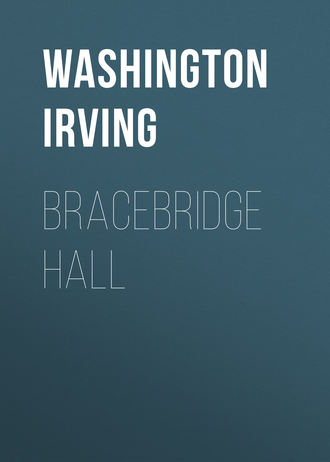
Вашингтон Ирвинг
Bracebridge Hall
THE WEDDING
No more, no more, much honour aye betide
The lofty bridegroom, and the lovely bride;
That all of their succeeding days may say,
Each day appears like to a wedding day.
BRAITHWAITE.
Notwithstanding the doubts and demurs of Lady Lillycraft, and all the grave objections that were conjured up against the month of May, yet the Wedding has at length happily taken place. It was celebrated at the village church in presence of a numerous company of relatives and friends, and many of the tenantry. The squire must needs have something of the old ceremonies observed on the occasion; so at the gate of the churchyard, several little girls of the village, dressed in white, were in readiness with baskets of flowers, which they strewed before the bride; and the butler bore before her the bride-cup, a great silver embossed bowl, one of the family reliques from the days of the hard drinkers. This was filled with rich wine, and decorated with a branch of rosemary, tied with gay ribands, according to ancient custom.
"Happy is the bride that the sun shines on," says the old proverb; and it was as sunny and auspicious a morning as heart could wish. The bride looked uncommonly beautiful; but, in fact, what woman does not look interesting on her wedding-day? I know no sight more charming and touching than that of a young and timid bride, in her robes of virgin white, led up trembling to the altar. When I thus behold a lovely girl, in the tenderness of her years, forsaking the house of her fathers and the home of her childhood, and, with the implicit, confiding, and the sweet self-abandonment which belong to woman, giving up all the world for the man of her choice; when I hear her, in the good old language of the ritual, yielding herself to him "for better for worse, for richer for poorer, in sickness and in health; to love, honour, and obey, till death us do part," it brings to my mind the beautiful and affecting self-devotion of Ruth: – "Whither thou goest I will go, and where thou lodgest I will lodge; thy people shall be my people, and thy God my God."
The fair Julia was supported on the trying occasion by Lady Lillycraft, whose heart was overflowing with its wonted sympathy in all matters of love and matrimony. As the bride approached the altar, her face would be one moment covered with blushes, and the next deadly pale; and she seemed almost ready to shrink from sight among her female companions.
I do not know what it is that makes every one serious, and, as, it were, awestruck at a marriage ceremony, which is generally considered as an occasion of festivity and rejoicing. As the ceremony was performing, I observed many a rosy face among the country girls turn pale, and I did not see a smile throughout the church. The young ladies from the Hall were almost as much frightened as if it had been their own case, and stole many a look of sympathy at their trembling companion. A tear stood in the eye of the sensitive Lady Lillycraft; and as to Phoebe Wilkins, who was present, she absolutely wept and sobbed aloud; but it is hard to tell half the time what these fond, foolish creatures are crying about.
The captain, too, though naturally gay and unconcerned, was much agitated on the occasion, and, in attempting to put the ring upon the bride's finger, dropped it on the floor; which Lady Lillycraft has since assured me is a very lucky omen. Even Master Simon had lost his usual vivacity, and had assumed a most whimsically solemn face, which he is apt to do on all occasions of ceremony. He had much whispering with the parson and parish-clerk, for he is always a busy personage in the scene; and he echoed the clerk's amen with a solemnity and devotion that edified the whole assemblage.
The moment, however, that the ceremony was over, the transition was magical. The bride-cup was passed round, according to ancient usage, for the company to drink to a happy union; every one's feelings seemed to break forth from restraint. Master Simon had a world of bachelor pleasantries to utter, and as to the gallant general, he bowed and cooed about the dulcet Lady Lillycraft, like a mighty cock pigeon about his dame.
The villagers gathered in the churchyard to cheer the happy couple as they left the church; and the musical tailor had marshalled his band, and set up a hideous discord, as the blushing and smiling bride passed through a lane of honest peasantry to her carriage. The children shouted and threw up their hats; the bells rung a merry peal that set all the crows and rooks flying and cawing about the air, and threatened to bring down the battlements of the old tower; and there was a continual popping off of rusty firelocks from every part of the neighbourhood.
The prodigal son distinguished himself on the occasion, having hoisted a flag on the top of the school-house, and kept the village in a hubbub from sunrise with the sound of drum, and fife, and pandean pipe; in which species of music several of his scholars are making wonderful proficiency. In his great zeal, however, he had nearly done mischief; for, on returning from church, the horses of the bride's carriage took fright from the discharge of a row of old gun-barrels, which he had mounted as a park of artillery in front of the school-house, to give the captain a military salute as he passed.
The day passed off with great rustic rejoicings. Tables were spread under the trees in the park, where all the peasantry of the neighbourhood were regaled with roast beef and plum-pudding, and oceans of ale. Ready-Money Jack presided at one of the tables, and became so full of good cheer, as to unbend from his usual gravity, to sing a song out of all tune, and give two or three shouts of laughter, that almost electrified his neighbours, like so many peals of thunder. The schoolmaster and the apothecary vied with each other in making speeches over their liquor; and there were occasional glees and musical performances by the village band, that must have frightened every faun and dryad from the park. Even old Christy, who had got on a new dress, from top to toe, and shone in all the splendour of bright leather breeches, and an enormous wedding favour in his cap, forgot his usual crustiness, became inspired by wine and wassail, and absolutely danced a hornpipe on one of the tables, with all the grace and agility of a mannikin hung upon wires.
Equal gaiety reigned within doors, where a large party of friends were entertained. Every one laughed at his own pleasantry, without attending to that of his neighbours. Loads of bride-cake were distributed. The young ladies were all busy in passing morsels of it through the wedding ring to dream on, and I myself assisted a fine little boarding-school girl in putting up a quantity for her companions, which I have no doubt will set all the little heads in the school gadding, for a week at least.
After dinner all the company, great and small, gentle and simple, abandoned themselves to the dance: not the modern quadrille, with its graceful gravity, but the merry, social, old country dance; the true dance, as the squire says, for a wedding occasion; as it sets all the world jigging in couples; hand in hand, and makes every eye and every heart dance merrily to the music. According to frank old usage, the gentlefolks of the Hall mingled, for a time, in the dance of the peasantry, who had a great tent erected for a ball-room; and I think I never saw Master Simon more in his element than when figuring about among his rustic admirers, as master of the ceremonies; and, with a mingled air of protection and gallantry, leading out the quondam Queen of May – all blushing at the signal honour conferred upon her.
In the evening, the whole village was illuminated, excepting the house of the radical, who has not shown his face during the rejoicings. There was a display of fireworks at the school-house, got up by the prodigal son, which had wellnigh set fire to the building. The squire is so much pleased with the extraordinary services of this last-mentioned worthy, that he talks of enrolling him in his list of valuable retainers, and promoting him to some important post on the estate; peradventure to be falconer, if the hawks can ever be brought into proper training.
There is a well-known old proverb that says, "one wedding makes many" – or something to the same purpose; and I should not be surprised if it holds good in the present instance. I have seen several flirtations among the young people that have been brought together on this occasion; and a great deal of strolling about in pairs, among the retired walks and blossoming shrubberies of the old garden; and if groves were really given to whispering, as poets would fain make us believe, Heaven knows what love-tales the grave-looking old trees about this venerable country-seat might blab to the world. The general, too, has waxed very zealous in his devotions within the last few days, as the time of her ladyship's departure approaches. I observed him casting many a tender look at her during the wedding dinner, while the courses were changing; though he was always liable to be interrupted in his adoration by the appearance of any new delicacy. The general, in fact, has arrived at that time of life when the heart and the stomach maintain a kind of balance of power; and when a man is apt to be perplexed in his affections between a fine woman and a truffled turkey. Her ladyship was certainly rivalled through the whole of the first course by a dish of stewed carp; and there was one glance, which was evidently intended to be a point-blank shot at her heart, and could scarcely have failed to effect a practicable breach, had it not unluckily been diverted away to a tempting breast of lamb, in which it immediately produced a formidable incision.
Thus did the faithless general go on, coquetting during the whole dinner, and committing an infidelity with every new dish; until, in the end, he was so overpowered by the attentions he had paid to fish, flesh, and fowl; to pastry, jelly, cream, and blancmange, that he seemed to sink within himself: his eyes swam beneath their lids, and their fire was so much slackened, that he could no longer discharge a single glance that would reach across the table. Upon the whole, I fear the general ate himself into as much disgrace, at this memorable dinner, as I have seen him sleep himself into on a former occasion.
I am told, moreover, that young Jack Tibbets was so touched by the wedding ceremony, at which he was present, and so captivated by the sensibility of poor Phoebe Wilkins, who certainly looked all the better for her tears, that he had a reconciliation with her that very day, after dinner, in one of the groves of the park, and danced with her in the evening; to the complete confusion of all Dame Tibbets' domestic politics. I met them walking together in the park, shortly after the reconciliation must have taken place. Young Jack carried himself gaily and manfully; but Phoebe hung her head, blushing, as I approached. However, just as she passed me, and dropped a curtsy, I caught a shy gleam of her eye from under her bonnet; but it was immediately cast down again. I saw enough in that single gleam, and in the involuntary smile that dimpled about her rosy lips, to feel satisfied that the little gipsy's heart was happy again.
What is more, Lady Lillycraft, with her usual benevolence and zeal in all matters of this tender nature, on hearing of the reconciliation of the lovers, undertook the critical task of breaking the matter to Ready-Money Jack. She thought there was no time like the present, and attacked the sturdy old yeoman that very evening in the park, while his heart was yet lifted up with the squire's good cheer. Jack was a little surprised at being drawn aside by her ladyship, but was not to be flurried by such an honour: he was still more surprised by the nature of her communication, and by this first intelligence of an affair that had been passing under his eye. He listened, however, with his usual gravity, as her ladyship represented the advantages of the match, the good qualities of the girl, and the distress which she had lately suffered; at length his eye began to kindle, and his hand to play with the head of his cudgel. Lady Lillycraft saw that something in the narrative had gone wrong, and hastened to mollify his rising ire by reiterating the soft-hearted Phoebe's merit and fidelity, and her great unhappiness, when old Ready-Money suddenly interrupted her by exclaiming, that if Jack did not marry the wench, he'd break every bone in his body! The match, therefore, is considered a settled thing; Dame Tibbets and the housekeeper have made friends, and drank tea together; and Phoebe has again recovered her good looks and good spirits, and is carolling from morning till night like a lark.
But the most whimsical caprice of Cupid is one that I should be almost afraid to mention, did I not know that I was writing for readers well acquainted in the waywardness of this most mischievous deity. The morning after the wedding, therefore, while Lady Lillycraft was making preparations for her departure, an audience was requested by her immaculate handmaid, Mrs. Hannah, who, with much priming of the mouth, and many maidenly hesitations, requested leave to stay behind, and that Lady Lillycraft would supply her place with some other servant. Her ladyship was astonished: "What! Hannah going to quit her, that had lived with her so long!"
"Why, one could not help it; one must settle in life some time or other."
The good lady was still lost in amazement; at length the secret was gasped from the dry lips of the maiden gentlewoman; she had been some time thinking of changing her condition, and at length had given her word, last evening, to Mr. Christy, the huntsman.
How, or when, or where this singular courtship had been carried on, I have not been able to learn; nor how she has been able, with the vinegar of her disposition, to soften the stony heart of old Nimrod; so, however, it is, and it has astonished every one. With all her ladyship's love of match-making, this last fume of Hymen's torch has been too much for her. She has endeavoured to reason with Mrs. Hannah, but all in vain; her mind was made up, and she grew tart on the least contradiction. Lady Lillycraft applied to the squire for his interference. "She did not know what she should do without Mrs. Hannah, she had been used to have her about her so long a time."
The squire, on the contrary, rejoiced in the match, as relieving the good lady from a kind of toilet-tyrant, under whose sway she had suffered for years. Instead of thwarting the affair, therefore, he has given it his full countenance; and declares that he will set up the young couple in one of the best cottages on his estate. The approbation of the squire has been followed by that of the whole household; they all declare, that if ever matches are really made in heaven, this must have been; for that old Christy and Mrs. Hannah were as evidently formed to be linked together as ever were pepper-box and vinegar-cruet.
As soon as this matter was arranged, Lady Lillycraft took her leave of the family at the Hall; taking with her the captain and his blushing bride, who are to pass the honeymoon with her. Master Simon accompanied them on horseback, and indeed means to ride on ahead to make preparations. The general, who was fishing in vain for an invitation to her seat, handed her ladyship into her carriage with a heavy sigh; upon which his bosom friend, Master Simon, who was just mounting his horse, gave me a knowing wink, made an abominably wry face, and, leaning from his saddle, whispered loudly in my ear, "It won't do!" Then putting spurs to his horse, away he cantered off. The general stood for some time waving his hat after the carriage as it rolled down the avenue, until he was seized with a fit of sneezing, from exposing his head to the cool breeze. I observed that he returned rather thoughtfully to the house; whistling thoughtfully to himself, with his hands behind his back, and an exceedingly dubious air.
The company have now almost all taken their departure. I have determined to do the same to-morrow morning; and I hope my reader may not think that I have already lingered too long at the Hall. I have been tempted to do so, however, because I thought I had lit upon one of the retired places where there are yet some traces to be met with of old English character. A little while hence, and all these will probably have passed away. Ready-Money Jack will sleep with his fathers: the good squire, and all his peculiarities, will be buried in the neighbouring church. The old Hall will be modernised into a fashionable country-seat, or, peradventure, a manufactory. The park will be cut up into petty farms and kitchen-gardens. A daily coach will run through the village; it will become, like all other commonplace villages, thronged with coachmen, post-boys, tipplers, and politicians; and Christmas, May-day, and all the other hearty merry-makings of the "good old times" will be forgotten.







